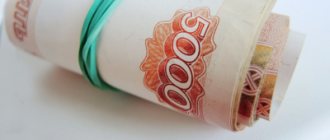Mortgage is the longest-term loan product. The term for which housing loans are issued can be up to 30 years. During this time, various changes may occur in the life of the borrower, which will force the debtor to think about the question: is it possible to refuse the mortgage and return the apartment taken with borrowed funds to the bank. The answer to this depends on the stage at which the target loan is being processed.
In the article we will consider the possibility and procedure for terminating a mortgage lending agreement after approval of the application and after signing the loan agreement.
How to cancel a mortgage
It is impossible to refuse a mortgage without the borrower having good reasons. If the client decides to cancel an already issued housing loan and simply stops making monthly payments, he may face the following unpleasant consequences:
- Increasing the amount of debt due to the accrual of penalties and penalties;
- Damage to the borrower’s credit history and blacklisting of all banks;
- Transferring the client's case to a collection agency, which is known for its methods of debt collection;
- Cancellation of the loan agreement in court and return of the mortgaged apartment to the bank.
To minimize the unpleasant consequences of terminating the contract, you will need to convince the creditor of the seriousness of the reasons.
There are several ways to cancel your mortgage after it has been issued:
- If the bank has already transferred loan funds to the borrower, but the client did not have time to use them, he will need to contact the bank with an application for full early repayment of the loan. If some time has passed since the transfer of funds and interest has already been accrued on the loan, you will have to pay it at your own expense.
- Sell an apartment purchased with a mortgage. To do this, you will need to obtain permission from the lender. If the bank agrees, the property is sold to a third party, who becomes the new borrower under the mortgage agreement.
These are all possible ways to get out of a mortgage. In addition, you can try to simply change the terms of the loan agreement to the most acceptable for the borrower. This will allow you to continue to pay off the debt, thereby maintaining ownership of the property.
Termination of a mortgage from a legal point of view
Typically, a housing loan agreement contains a clause according to which the borrower cannot unilaterally terminate the loan agreement. The only way to sever relations with the bank in this case is to obtain permission from the creditor for this procedure, that is, the termination must be bilateral.
Whatever the reason that prompted you to initiate separation from the bank, this procedure will be unprofitable for the latter. This means that certain difficulties await you.
There are 2 camps of those who have already repaid their mortgage: those who came to the bank themselves, and those who were visited by bailiffs.
First, fill out an application for termination of the mortgage agreement and take it to the bank. You must notify the lender of any changes in your financial circumstances, and all such notifications must be documented. In court, this document will confirm that you acted in accordance with previously concluded agreements.
You absolutely cannot become a willful defaulter and ignore calls and notifications from the bank. So you will receive fines, penalties, bad credit history and legal proceedings with costs paid at your expense.
Ultimately, the bank may sell the mortgaged apartment. But the amount that will be raised at auction for such distressed real estate may be significantly less than the market value of the apartment and may not even cover your principal debt. As a result, you will be left without an apartment and with debts that the court will collect from your official income.
Articles on the topic (click to view)
- Should I privatize my apartment in 2021 or not? Let's look at the pros and cons
- Metal garage real estate
- The procedure for purchasing an apartment with a mortgage on the secondary market: how to register housing
- Pros and cons of a will for an apartment: how to draw it up, how much it costs, tax in 2021
- Management, operation and maintenance of an apartment building
- Management company - what is it, what does it do and what are the requirements for it?
- Features of a tripartite lease agreement for non-residential premises
What to do if the borrower cannot pay for the mortgage
During the term of the mortgage agreement, the borrower's financial situation may change significantly, both for the better and for the worse. The reason for this may be the loss of a job, the death of a close relative, or, conversely, the birth of a child and going on maternity leave.
Regardless of the reasons why the borrower cannot pay for the mortgage, he needs to notify the lender about the current situation. If the client can prove that there are good reasons, the creditor may make concessions to the payer and offer one of several ways to solve the problem. It could be:
- Returning the apartment to the bank.
- Sale of a mortgaged apartment.
- Debt refinancing.
- Loan restructuring.
- Cancellation of the transaction in court.
- Renting out collateral real estate.
The result of these actions may be:
- Selling an apartment and paying off the mortgage using the proceeds;
- Change of borrower under a mortgage agreement;
- Changing the payment schedule;
- Reducing the monthly payment amount and increasing the total loan term;
- Distribution of the resulting debt over several months.
Most often, banks make concessions to borrowers who find themselves in difficult financial situations, since it is in their interests to repay the borrowed funds. They resort to legal proceedings only in exceptional cases, such as evasion of payment, as this is a lengthy and costly process.
What to do when a bank takes an apartment with a mortgage, legal advice
According to experts from the United Credit Bureau, as of July 1, 2019, the number of people who delayed loan payments to banks for more than three months reached 7.2 million people, and their number continues to grow steadily.
:
Who and when can the bank leave without a roof over their head?
How to avoid a sad ending?
How does everything work in practice?
Adviсe
To collect credit debts, banks go to court and, by decision, bailiffs seize accounts, forcibly withhold funds from debtors' salaries, and confiscate their property for subsequent sale.
In the worst case scenario, debtors are deprived of housing.
Who and when can the bank leave without a roof over their head?
How quickly the bank will foreclose on the property and whether it will be able to do so at all will depend on the type of loan that resulted in the debt.
The debt arose on a consumer loan
When taking out a consumer loan, this happens rarely and only as a last resort. This is simply not profitable for the bank. Litigation, appeal to the bailiff service, seizure, sale of property. All this entails a loss of time and money.
It is easier for the bank to sell the loan to a collection agency (if the amount is not very large) or to meet the debtor halfway and satisfy his request for an installment plan or debt restructuring.
Note!
If the amount of debt is large, the debtor hides and does not try to resolve the issue, the bank can go to court with a demand to collect the debt.
According to Art. 69 Federal Law 229, first, a forcible seizure will be imposed, funds will be written off from the debtor’s accounts, they will be deducted from wages, then the recovery will be applied to the property, and only if the proceeds are insufficient to cover the debt will it come to the deprivation of residential real estate.
However, if a minor child lives in it or if the debtor does not have other suitable housing (Article 446 of the Code of Civil Procedure), the bank can only seize him, prohibiting him from selling or exchanging the residential premises, but he will not be able to take it away.
If mortgage debt
The situation will be different if residential real estate is purchased with a mortgage. An apartment or house, according to the terms of the mortgage agreement, is itself a collateral that ensures the timely return of the loan money to the bank with interest.
That's why
- if the mortgagor delays monthly mandatory payments for more than 90 days;
- the resulting amount of debt is more than 5% of the value of the mortgaged apartment;
- violation of the payment schedule at least three times during the year.
They will give the bank a reason to immediately go to court to foreclose on the mortgaged apartment and its subsequent sale at public auction (Article 54.1 of the Federal Law No. 102).
What if this is the only housing and minors are registered there?
At the same time, the court will not have any obstacles to take away the apartment and evict the debtor from it.
If a minor child is registered in an apartment that is mortgaged, then the issue of eviction will be considered by the guardianship authorities.
If the apartment taken on mortgage is the debtor’s only home, then according to Art. 95 housing complex, he can be provided with housing from the flexible fund, although in practice this happens quite rarely, people are often simply evicted, and the bank sells the apartment for mortgage debts.
It should be noted that a debtor can also be evicted by the execution signature of a notary (out-of-court procedure), if the mortgage agreement included such a clause (Article 55 of the Federal Law-102) and was notarized. In this case, the sale of real estate will be carried out as usual.
How to avoid a sad ending?
It is unprofitable for both parties to bring the matter to the point of eviction of the debtor from an apartment taken on a mortgage.
The fact is that the sale price of an apartment put up for auction will be only 80% of its value, established by an independent expert in court (Article 54 p. 4 of the Mortgage Law).
If they can’t buy it the first time, the price will drop by another 15%, plus you will have to pay a fee to the auction organizer.
It is important!
The proceeds from the sale of real estate will be used to pay expenses associated with legal costs, interest, fines, and only then will be taken into account to write off the principal debt (Article 319 of the Civil Code).
As a result, the borrower may be left with an incompletely repaid debt and without a roof over their head.
Therefore, if financial difficulties arise, the debtor should contact the bank with an application to defer payment, revise the payment schedule, increase the loan term while simultaneously reducing the amount of monthly payments, and try, together with bank employees, to find a way out of this situation.
An application with documents attached to it confirming the reasons for the problem with payments must be written in two copies, on one of which the bank must put a mark indicating acceptance of the request for consideration.
In court, this document will serve as confirmation of the debtor’s desire to voluntarily fulfill his debt obligations under the mortgage. The court may change the terms of the mortgage agreement at the request of the borrower, based on Art.
451 of the Civil Code of the Russian Federation, or reduce the amount of the fine, penalty Art. 333 of the Civil Code of the Russian Federation (and, as practice shows, it is essential), as well as at the request of the debtor, indicating valid reasons, to postpone the sale of the apartment at auction for one year (Art.
350 Civil Code of the Russian Federation).
Banks, in turn, do not want to take away housing and try to meet their borrower halfway, offering various options to resolve the current situation.
How does everything work in practice?
Typically, banks begin to sound the alarm as soon as there is a 10-day delay on a mortgage loan. Five days before the due date of the obligatory payment, they remind the borrower by SMS message about the need to make a payment, after 10 days of absence, they call the debtor, finding out the reasons for the delay, a month later, they send a letter with a reminder, then they try to resolve the issue out of court.
During this time, the amount of the debt increases, the percentage of accrued penalties increases, and conditions are created for the mortgagee to go to court with a demand for the mortgagor to force him to fulfill his obligations under the mortgage.
A month before the start of the trial, the bank must warn its borrower about this in writing.
Helpful advice!
Failure to receive written notice is not a reason for postponing the consideration of the case or invalidating the court decision.
Within two months, the court will familiarize itself with the case materials, listen to the opinions of both parties and make a decision in which, according to Art. 54 Federal Law 102, it will be indicated:
- The value of the mortgaged property. It is established either by agreement of both parties, or by the court, based on the conclusion of an independent expert.
- The method for selling residential real estate is prescribed.
- The amount and procedure for cash payments to be made through the sale of housing.
- Registration information about the apartment (address, cadastral number) is indicated.
Then the apartment is put up for public auction or, by agreement of the parties (which must be agreed upon in court or pre-trial), sold at an open auction.
After the sale of housing at auction, a new owner appears, who has the right to demand the eviction of persons illegally staying there, resorting to the help of bailiffs.
Forced eviction can only occur by court decision and is carried out by authorized officials.
Adviсe
To significantly reduce your own risks when purchasing an apartment with a mortgage or taking out a loan for a large amount, you should:
- Carefully read the terms of the mortgage (loan) agreement, the amount of penalties, fines, and penalties specified therein that may arise as a result of financial difficulties. Take this into account when choosing a bank.
- Include the risk of job loss in mortgage insurance.
- Before taking out a mortgage (loan), create a reserve fund for several payments in advance (experts advise at least three months). In case of financial problems, they will help the borrower not to fall behind the payment schedule and will protect him from the accrual of penalties and fines for some time.
What to do if your mortgage payment is late
If you have difficulties paying your debt, there is no need to waste time and avoid communicating with the credit institution, because you will still have to pay the bills. Constructive dialogue and the desire to fulfill your obligations to the bank are the only correct way out of this situation.
Source:
Is it possible to refuse a mortgage when spouses divorce?
If the spouses who took out the mortgage are co-borrowers under the agreement and decide to divorce, then the question often arises before them: is it possible to refuse the mortgage in favor of the ex-spouse. Based on Art. 34 of the RF IC, real estate acquired during marriage is joint property, even if it was purchased with borrowed funds.
In the event of a divorce, spouses who pay a mortgage together may:
- Continue to pay the debt together, and after it is paid off, divide the apartment or sell it;
- Divide the apartment during the validity period of the mortgage agreement, allocating shares to each of the spouses. In this case, the ex-husband and wife will become independent borrowers, the debt between them will be divided in proportion to the allocated shares. In this case, each spouse will pay the mortgage for their part of the property;
- Give up your share in the real estate and re-issue the mortgage to one of your former spouses. In this case, he will continue to repay the loan and become the sole owner of the apartment. He will have to compensate the second spouse for part of the funds already paid.
Most often, banks advise spouses to repay the loan and sell the apartment in order to divide the money.
Refund of money upon cancellation of the mortgage. What will happen to the money already paid?
The most difficult situation is when the mortgage agreement has already been signed, the borrower regularly pays the debt for some time, but recently the situation has changed for the worse and he can no longer pay off his obligations to the bank.
Then he decides to refuse the mortgage, while he is concerned with the question: “What will happen to the money that has already been paid? Will the bank return them if the apartment is put up for auction?
If the mortgaged item is put up for sale and a buyer is found, then the bank recalculates the mortgage. Previously paid funds are not returned to the borrower, but the debt is significantly reduced or repaid (if the money after the sale of the apartment was enough to pay off the mortgage debt).
It is possible to refuse a mortgage if an application to receive funds from the bank has been submitted, but the agreement has not been signed; if the agreement is signed, but the funds have not yet been transferred to the borrower and if they have been transferred to him, but he has not used them.
If the mortgage agreement has been in effect for some time, but the borrower decides to refuse the mortgage, then this is much more difficult to do. You will need to go to the bank and notify it of your insolvency.
The bank does not terminate the agreement, but does everything possible to make concessions to the borrower and not bring the matter to court: it offers to refinance the mortgage, extends its validity, temporarily suspends payments under the agreement, etc.
Expert opinion
Musikhin Viktor Stanislavovich
Lawyer with 10 years of experience. Specialization: civil law. Member of the Bar Association.
Remember that it is impossible to simply refuse a mortgage, therefore, if financial difficulties arise, you must inform the bank about this in order to solve the problem with the mortgage together and not lose your home.
How to get money back when terminating your mortgage
If you terminate the mortgage agreement, you will be able to return the money spent on servicing the loan. This is possible if the bank has agreed to sell the collateral real estate and change the borrower under the agreement. In this case, the bank will calculate the funds already paid and the balance of the debt. The money that the previous borrower has already paid to the lender must be returned to the seller of the property by the buyer. Thus, the former borrower can receive back not only the funds paid as monthly payments, but also the down payment on the mortgage.
Is it possible to refuse to be a co-borrower on a mortgage?
The co-borrower may refuse to fulfill its obligations to service the mortgage. In this case, the collateral property will be transferred to the benefit of the second co-borrower, who will repay the loan in full.
In this case, the bank will reissue the mortgage agreement; in the new version of the agreement, only the remaining co-borrower will be indicated as the debtor. If necessary, he will be able to attract a new joint borrower.
This option requires mandatory consent to amend the agreement from the lender and the second co-borrower.
Refusal of guarantee
According to the Civil Code of Russia, under certain circumstances, a citizen may refuse to guarantee a mortgage agreement. In Art. 367 of the Civil Code of the Russian Federation specifies all situations in which a person can exercise this right.
It is impossible to refuse to act as a guarantor for a loan in the event of the death of the borrower.
To refuse a guarantee, you will need to submit an application and consent from the borrower to the bank. The final decision in this case always remains with the creditor.











